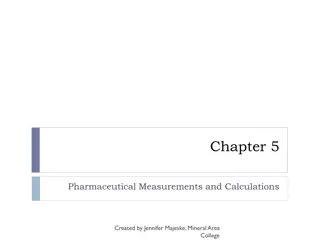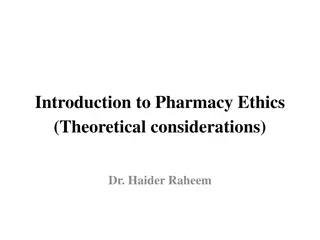Ethical Issues in Clinical Pharmacy Research by Dr. Haider Raheem Mohammad
Research ethics play a crucial role in clinical trials and therapeutic research in the field of pharmacy. From discovery to validation, all medicines undergo rigorous evaluation processes to ensure safety, efficacy, and freedom from adverse effects. Clinical trials in both animals and humans are essential to demonstrate efficacy and identify potential side effects. The history of clinical evaluation procedures dates back to early studies on scurvy and dropsy treatments, leading to modern double-blind, placebo-controlled trials as the gold standard. Clinical trials are conducted in phased studies, starting with small-scale assessments in healthy volunteers to evaluate pharmacokinetics and safety.
Download Presentation

Please find below an Image/Link to download the presentation.
The content on the website is provided AS IS for your information and personal use only. It may not be sold, licensed, or shared on other websites without obtaining consent from the author. Download presentation by click this link. If you encounter any issues during the download, it is possible that the publisher has removed the file from their server.
E N D
Presentation Transcript
Ethical Issues Related Ethical Issues Related to Clinical Pharmacy to Clinical Pharmacy Research Research Dr. Haider Raheem Mohammad Dr. Haider Raheem Mohammad
Research ethics and clinical trials in therapeutic research All medicines employed in pharmacy are subjected to two linked phases of activity: discovery and validation. Some botanical species like the opium poppy were discovered by chance to have medicinal value some 2000 or more years ago and validated by simple trial and error. The vast majority of the more potent and selective drugs used in the UK today have been subjected to systematic evaluation, testing and approval. Since the introduction of voluntary assessment by the Committee on Safety of Drugs in the UK in 1964, formal regulatory approval of all medicines has become rigorous and mandatory. processes of discovery,
Research ethics and clinical trials in therapeutic research Formal validation involves testing both in animals and in humans. In the first instance, there is a requirement for testing in animals for evidence of potential activity, mode of action, metabolic route and toxicity. Once empirical safety and activity are confirmed, subsequent testing in human beings is undertaken to determine pharmacodynamics, and to evaluate effectiveness and freedom from adverse effects. All human beings and non-human animals have interests, for instance in not being harmed, and this is at the heart of ethical considerations. basic pharmacokinetics, Clinical trials in human beings have two main functions: 1. to demonstrate efficacy 2. to identify possible adverse (side) effects.
Research ethics and clinical trials in therapeutic research Early forerunners of today s clinical evaluation procedures are James Lind s demonstration of the ability of citrus fruit juice to prevent scurvy, a disease common among sailors on long voyages (A Treatise on Scurvy, 1754) and William Withering s studies with foxglove preparations to treat dropsy, oedema caused by congestive heart failure (An Account of the Foxglove and some of its Medical Uses, 1785). By modern standards, these studies would be considered to be rather crude and it is unlikely that much thought was given to matters of patient autonomy. But the real precursor of the modern comparative clinical trial procedure is probably the Medical Research Council s evaluation of streptomycin in the treatment of tuberculosis, reported in the British Medical Journal in 1948. The so-called gold standard of contemporary clinical trials is the double-blind placebo-controlled study, where neither patient nor practitioner knows who receives an experimental treatment or who receives a control (an established comparator or placebo).
Research ethics and clinical trials in therapeutic research Clinical trials are undertaken on a phased basis, with increasing numbers: 1. phase I: small-scale study in healthy volunteers (about 20 80) to assess pharmacokinetics, safe or tolerable dosage and route of administration 2. phase II: patients (100 300) suffering from relevant disease to provide evidence of effective dosage, and safety 3. phase III: patients (1000 3000) to establish formal safety, effectiveness and comparability 4. phase IV: postmarketing studies in patients to identify low- level adverse effects (unlimited > 3000).
Research ethics and clinical trials in therapeutic research Although very many clinical trials and experimental studies are largely unproblematic, they are not always routine matters and risk free. In March 2006, eight young, healthy male volunteers participated in a phase I study involving an experimental T cell agonist TGN1412 in London. All six of those who received the active drug rather than placebo rapidly developed severe widespread functional failure in what appears to have been a cytokine storm. This is an exaggerated response that occurs when the normal reaction of T cell stimulation of cytokines becomes uncontrolled. The incident provoked many questions about the nature of this particular study (ethical and technical), and the controls, prestudy assessment and recruitment policy.
Ethical issues Various aspects of randomised clinical trials have an ethical dimension. In participating in clinical trials, both healthy volunteers and patients are entitled not to be harmed and for respect to be shown for their autonomy. A duty of care to prevent harm is generally taken care of by (a) ensuring the adequacy of pretrial safety data and (b) by appropriate supervision and monitoring during and if necessary, following the trial. The most important issues concern personal autonomy and consent. This means being sure that the patient: 1. is fully aware of the main aspects of the study, including an assessment of possible personal benefits or risks 2. has a clear understanding that they may receive an inactive placebo 3. does not feel obliged to participate for any reason and knows that he or she may withdraw at any stage without being penalised.
Ethical issues A pivotal aspect of non-open, comparative clinical studies is that treatment is allocated not by a practitioner exercising judgement and knowledge of an individual patient but by following a randomization schedule. Studies are blinded to eliminate the risk (as far as is possible) of bias that could call into question the reliability of a study and its conclusions. It is only because there is genuine doubt about the efficacy or adverse profile of a potential but unproven treatment that a study involving a control group and randomisation may be justified.
Ethical issues The term equipoise is sometimes used to indicate the balance of knowledge prior to a clinical trial study. It means that there must be indisputable uncertainty concerning what is the best or optimum treatment. At the same time, physicians have an express obligation to benefit their patient s illness or disease. Randomisation with or without blinding prevents a practitioner from exercising personal judgement with respect to a patient s medication. Hence there is a tension between therapeutic obligation to an individual patient and therapeutic research that tends to be overlooked or glossed over when patients are entered into clinical trials.
Legal considerations The World Medical Association in its Declaration of Helsinki has made influential policy statements: Ethical Principles for Medical Research Involving Human Subjects (adopted June 1964, amended 1983, 1989, 1996, 2000, 2002 and 2004). The Medicines for Human Use (Clinical Trials Regulations) 2004 (Statutory Instrument requirements for informed consent of potential clinical trial participants and incorporates the provisions of the European Clinical Trials Directive (EC2001/20) into UK law. Paragraph 3(1) of Part 1 of Schedule 1 to the UK Regulations defines informed consent for capable adults: 2004 No. 1031) covers
Legal considerations A (capable) person gives informed consent to take part in a clinical trial only if his decision: a) is given freely after that person is informed of the nature, significance, implications and risks of the trial; and b) either i. is evidenced in writing, dated and signed, or otherwise marked, by that person so as to indicate his consent, or ii. if the person is unable to sign or to mark a document so as to indicate consent, is given orally in the presence of at least one witness and recorded in writing. Provision is also made in the 2004 Clinical Trials Regulations for minors who are defined in the regulations as being under the age of 16 years. Consent must be given on behalf of a minor prior to inclusion in a trial by a parent or person with parental responsibility.
Use of animals in research Thousands of animals, including rodents, rabbits, guinea pigs, some monkeys and higher apes are used in the assessment of the mode of action and toxicity of new chemical entities with potential to become medicinal substances. Over 2.85 million procedures with animals were undertaken in Britain in 2004 an increase of approximately 63 000 above 2003.
Ethical issues Significant reports on animals in research were published by a parliamentary select committee on Animals in Scientific Procedures (July 2002), and by the Nuffield Council on Bioethics (2005). There are two main points of criticism of the use of animals for drug testing. 1. The use of animals for such purposes is morally wrong in particular, it is speciesist (the lives of animals are considered to be of less value than those of human beings). In other words, because animal lives are less valued, they can be treated as a means to human ends, even where this involves causing pain or distress.
Ethical issues 2. Using animals to try to predict the behaviour of drugs in human beings is scientifically invalid. It relies on a mistaken analogy between the biological systems of animals and humans there are similarities but often there are crucial differences. Even if some biochemical or enzyme systems are common to both humans and some other animal species, those systems operate within the holistic context of the individual species. Hence toxicological behaviour of the drug may be species dependent. the pharmacological and The two criticisms can be made independently or in conjunction: the use of animals in research is morally indefensible and/or intellectually unsupportable, or as a fallback position if one fails.
Legal considerations The use of animals in research in the UK is controlled within The Animals (Scientific Procedures) Act 1986. All relevant procedures, premises and personnel are subject to licensing within the Act, and the Home Office operates an inspectorate to ensure compliance. Under the Protection of Animals Act 1911 (1912 in Scotland), it is an offence to cause unnecessary suffering to any domestic or captive animal. The Royal Society publishes a useful summary, The Use of Animals in Research: AGuide for Scientists (2004; www.royalsoc.ac.uk).
The Declaration of Helsinki is a set of ethical principles regarding experimentation developed for the medical community by the World Medical (WMA). It is widely regarded as the cornerstone document on human research ethics. The Declaration of Helsinki was originally adopted on June 1964 in Helsinki, Finland, and has since undergone revisions (the most recent at the General October 2013) clarifications, considerably in length from 11 paragraphs in 1964 to 37 in the 2013 version. The Declaration is an important document in the history of research ethics as it is the first significant effort of community research itself and forms the basis of most documents. human seven Association Assembly and in two growing It is not a legally binding instrument international law, but instead draws its authority from the degree to which it has been codified in, national or regional legislation and regulations. under the the to medical regulate or influenced, subsequent
Adopted by the 18th WMA General Assembly, Helsinki, Finland, June 1964 and amended by the: 29th WMA General Assembly, Tokyo, Japan, October 1975 35th WMA General Assembly, Venice, Italy, October 1983 41st WMA General Assembly, Hong Kong, September 1989 48th WMA General Assembly, Somerset West, Republic of South Africa, October 1996 52nd WMA General Assembly, Edinburgh, Scotland, October 2000 53rd WMAGeneral Assembly, Washington DC, USA, October 2002 (Note of Clarification added) 55th WMA General Assembly, Tokyo, Japan, October 2004 (Note of Clarification added) 59th WMA General Assembly, Seoul, Republic of Korea, October 2008 64th WMA General Brazil, October 2013 Assembly, Fortaleza,























